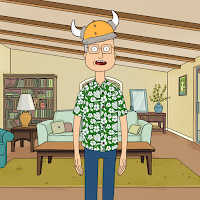Unless we're Facebook friends (
and no, we really don't need to be...I'm just saying) you probably don't know that I've had a painful return trip from two weeks in Alaska. I had to go last-minute to fill in for a guy and Alaska is great.....outside of the city. I spent two weeks in Anchorage and let's just say I'm glad to be home. My flight back got slipped 17 hours and that meant I had to "sleep" in the terminal last night and just not a good time all around.
Now I generally love travel...going places....I just don't care for the actually travelling portion of a trip. Of course, when things go stupid, and they went quite stupid on this trip, it's hard to NOT think about travelling in general.....
....I've got notes for a way-too-big random (Travel) event generator that I should probably get back to someday, but it had so many sub-tables that it should really be put together for TableSmith or Inspiration Pad. Thinking about the myriad of things that can, and do, happen while travelling.... 'cause murder hobos have to travel.
In most of the games I've played in travel isn't generally hand-waived, or more importantly travel to a new destination isn't hand-waived. Quite often "routine" travel maybe gets some random, not-sure-the-GM-even-looks handful of dice rolls, but the travel to a new place gets the standard wandering monster checks, maybe some planned side encounters, the whole she-bang.
Now I've always thought the biggest problem with "travel" in RPGs is that there is too much freedom, while at the same time the illusion of no freedom at all. I've seen a few different GMs just make some random encounter rolls and if nothing happens, maybe have the group stop each night. Other GMs...no results, just push on through until the destination is reached. That can make things seem a little rail-roady (that's a word......). On the flip side, especially if you have some "special" or just bored, players, the GM can get a bunch of interjections where a player wants a description of the area they're in and anything described for them is an opportunity to go "off the rails".
There's probably a few ways to find a middle ground.....but one of my favorites comes from an old-school (video) game designer whose name escapes me......he took the map and marked out "rational" decision points and got in the habit of describing to the players the surrounding at each of these decision points. The party could be travelling between two cities and the first day is a long boring stretch of road, so that is one generic increment. When the party gets to the swollen river they can choose to cross, or go up or down the bank to find a better crossing. These decision points may be close together in some areas and further away than others, but the idea is that the party has to do some minimal interactions along the route, and there isn't a scramble to describe some random area because these conversations (as it were) were somewhat scripted.

I once wrote an adventure where I initially drew a rough map and had an idea for the (simple) plot. When it came time to actually write the parts between the main planned encounters I made a "simple" decision point map, overlayed it on my actual map, and then wrote up brief descriptions to each decision point. The adventure was a mystery, but the players were trying to figure out and track down a BBG, so most of the decision points guided the players along the way.......
most. If the players wanted to go left instead of right when right seemed to make the most sense, I made sure the "wrong" way reinforced the "correct" direction of travel. I think it gave the players a bit more freedom, allowed them to skip over some areas if that's just the way they worked, and gently guided them along the adventure.
The more I think about this methodology the more I realize my random table generator idea would need a lot of work to make it not be a "here's all the crap that happened along the way", but I am tired and in much need of sleep....








